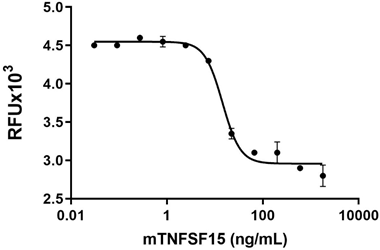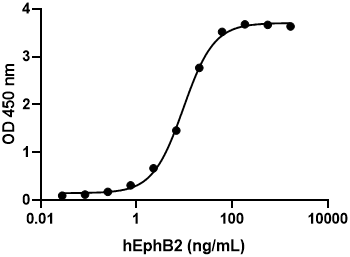- Clone
- 65B12 (See other available formats)
- Regulatory Status
- RUO
- Other Names
- Thymic stromal lymphopoietin (TSLP)
- Isotype
- Rat IgG2a, κ
- Ave. Rating
- Submit a Review
- Product Citations
- publications
_Recombinant_100913.jpg&Width=240&Height=300&altFmImage_path=&Compression=90&Crop=5)
| Cat # | Size | Price | Quantity Check Availability | Save | ||
|---|---|---|---|---|---|---|
| 521903 | 50 µg | $176 | ||||
| 521904 | 500 µg | $581 | ||||
TSLP was initially identified in conditioned medium from a mouse thymic stromal cell line. Human and mouse TSLP are only 43% identical at the amino acid level, and TSLP, like IL-7, exhibits species-specific functions and may function differently in humans and mice. TSLP binds to a heterodimeric receptor constituted by IL-7Ra and TSLPR. TSLPR has low affinity for TSLP, but in combination with IL-7Ra generates a high affinity binding site. TSLP has been associated with the development of allergic disorders in humans, such as asthma, atopic dermatitis, and food allergies. The susceptibility to allergic diseases has been associated to basophil induction by TSLP, and Th2 cytokine production induced by TSLP in mast cells. In addition, TSLP has been associated to the development of Tregs, and blocking TSLPR leads to delayed functional maturation of thymic Tregs. TSLPR has been detected in Tregs from allergic asthmatic patients. TSLP directly activates STAT5 in Tregs and suppresses its suppressive activities; additionally, it inhibits IL-10 production. Human TSLP induces the release of T cell-attracting chemokines (CCL17 and CCL22) from monocytes and enhances the T cell stimulatory capacity of the CD11c+ subset of dendritic cells. TSLP induces proliferation of naïve T cells. In addition, it can drive Th2 differentiation via the induction of IL-4 production, and drives Th2 cytokine-mediated inflammation by acting on bone marrow-resident progenitors, which promotes basophil hematopoiesis. TSLP is upregulated in epithelial cells by IL-1α, TNFα, and Th2 cytokines.
Product DetailsProduct Details
- Verified Reactivity
- Mouse
- Antibody Type
- Monoclonal
- Host Species
- Rat
- Immunogen
- Thymus stromal lymphopoietin
- Formulation
- Phosphate-buffered solution, pH 7.2, containing 0.09% sodium azide.
- Preparation
- The antibody was purified by affinity chromatography and conjugated with biotin under optimal conditions.
- Concentration
- 0.5 mg/ml
- Storage & Handling
- The antibody solution should be stored undiluted between 2°C and 8°C. Do not freeze.
- Application
-
ELISA Detection - Quality tested
- Recommended Usage
-
Each lot of this antibody is quality control tested by ELISA assay. For ELISA detection applications, a concentration range of 0.5-2.0 µg/ml is recommended. To obtain a linear standard curve, serial dilutions of TSLP recombinant protein ranging from 2000 to 31.3 pg/ml are recommended for each ELISA plate. It is recommended that the reagent be titrated for optimal performance for each application.
- Application Notes
-
The biotinylated 65B12 antibody is useful as a detection antibody in a sandwich ELISA, when used in conjunction with purified 28F12 antibody (Cat. No. 515202) as the capture antibody.
- RRID
-
AB_2561715 (BioLegend Cat. No. 521903)
AB_2561716 (BioLegend Cat. No. 521904)
Antigen Details
- Structure
- Cytokine
- Distribution
-
Epithelial cells, mast cells, basophils, epidermal keratinocytes in atopic dermatitis, synovial fibroblast in arthritis rheumatoid, human airway smooth muscle cells
- Function
- Induces proliferation of naïve T cells, the release of T cell-attracting chemokines (CCL17 and CCL22) from monocytes, and the T cell stimulatory capacity of CD11c+ subset of dendritic cells; drives Th2 differentiation, drives Th2 cytokine-mediated inflammation to promote basophil hematopoiesis
- Interaction
- Monocyte, dendritic cells, activated human basophils, activated human T cells, Langerhans cells, B cells, mast cells, activated pulmonary Tregs, NKT cells
- Ligand/Receptor
- Heterodimeric receptor complex composed of the IL-7 receptor α chain (IL-7Rα) and the TSLP receptor (TSLPR or CRLF2)
- Cell Type
- Basophils, Epithelial cells, Fibroblasts, Mast cells
- Biology Area
- Immunology
- Molecular Family
- Cytokines/Chemokines
- Antigen References
-
1. Levin SD, et al. 1999. J. Immunol. 162:677.
2. Reche PA, et al. 2001. J. Immunol. 167:336.
3. Omori M and Steven Ziegler. 2007. J. Immunol. 178:1396.
4. Rochman I, et al. 2007. J. Immunol. 178:6720.
5. Mazzucchelli R, et al. 2008. Blood 112:3283.
6. Siracusa MC, et al. 2011. Nature 477:229.
7. Nguyen KD, et al. 2010. Allergy Asthma Clin. Immunol. 6:4. - Gene ID
- 53603 View all products for this Gene ID
- UniProt
- View information about TSLP on UniProt.org
Related FAQs
- How many biotin molecules are per antibody structure?
- We don't routinely measure the number of biotins with our antibody products but the number of biotin molecules range from 3-6 molecules per antibody.
Other Formats
View All TSLP Reagents Request Custom Conjugation| Description | Clone | Applications |
|---|---|---|
| Biotin anti-mouse TSLP | 65B12 | ELISA Detection |
Customers Also Purchased
Compare Data Across All Formats
This data display is provided for general comparisons between formats.
Your actual data may vary due to variations in samples, target cells, instruments and their settings, staining conditions, and other factors.
If you need assistance with selecting the best format contact our expert technical support team.
 Login/Register
Login/Register 



_Recombinant_100913.jpg&Height=80&altFmImage_path=&Compression=90&Crop=5)





_Recombinant_100913.jpg)



_Recombinant_100913.jpg&Width=150&altFmImage_path=&Crop=5)



Follow Us